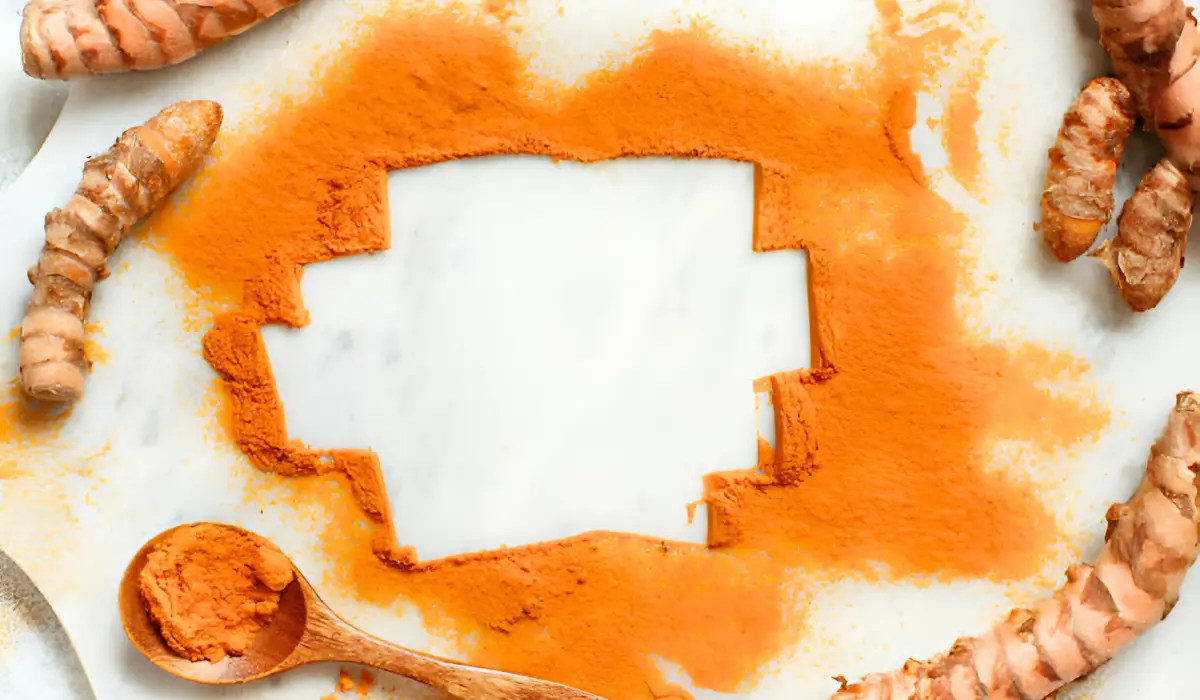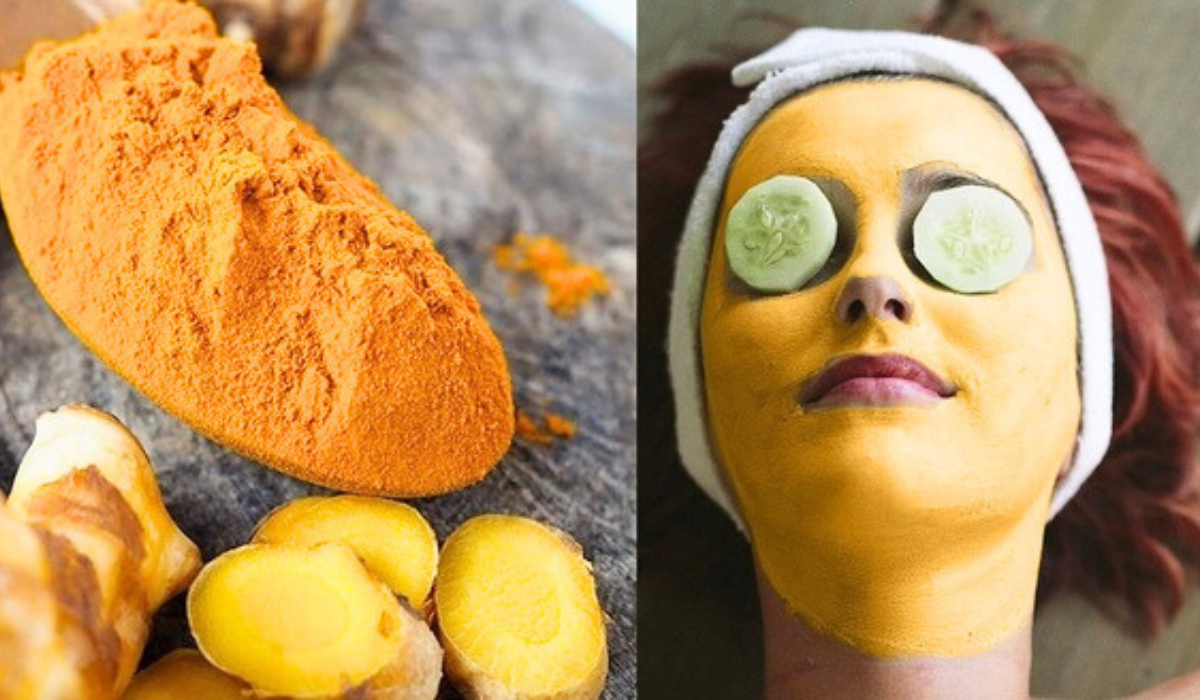Turmeric is a hugely popular spice used extensively in culinary settings. Besides, its possible anti-inflammatory effects and positive impact on digestion make it a regular ingredient in traditional medicinal remedies.
On top of that, Turmeric is also a regular skin care remedy that promises glowing and flawless skin. Benefits apart, research has also shown potentially adverse effects of turmeric on the skin. That’s why it’s prudent to know the side effects of turmeric on your face before applying that turmeric face mask or a topical cream.
This article explores the often less-adorned aspect of applying turmeric on the face. From common reactions to cautionary measures for individuals with certain skin conditions, we explore it all.
Turmeric at a Glance – Potential Benefits and Side-effects on Skin

Here’s a quick overview of turmeric along with its many benefits and side effects on skin;
| Characteristics | Details |
| Scientific Name | Curcuma longa |
| Active Compound | Curcumin |
| Traditional Use | Anti-Inflammatory and Skin Brightening |
| Benefits on Skin | Treat dark spots, hyperpigmentation |
| Common Side-effects | Allergic reactions, Staining of the skin, Dryness, Irritation |
| Interaction with other Skin Conditions | May exacerbate psoriasis and eczema |
| Safety Tip | Use in moderation, diluted form |
Common Side-effects of Turmeric On Face
You might be only aware of the extraordinary benefits of turmeric, often stemming from centuries-old usage. However, modern research has also shed light on its often-overlooked negative impact on the face and skin. Let’s explore how turmeric can be detrimental to the face and skin;
Allergic Reactions In Some Individuals
The active compound, curcumin is a known allergen and has been reported to cause allergic reactions in some individuals. Around 11 studies aiming to establish the anti-inflammatory properties of turmeric have also found that it can act as a potential allergen.
When applied by sensitive individuals, it can trigger an allergic response. Symptoms include redness, itching, swelling, or rash on the applied area. That’s why a patch test is always recommended before applying any turmeric-based cream to ensure it doesn’t cause an allergic reaction.
Turmeric Can Stain the Skin
Turmeric is rich in curcumin, which gives it its signature bright yellow color. While turmeric has traditionally been used as a skin whitening agent, particularly in ayurvedic remedies, the extreme yellow color can also stain the skin. Prolonged use or high concentration could lead to potential staining of the face. To minimize staining from turmeric use small quantities or blend it with other ingredients.
Skin Dryness or Irritation
Turmeric is an active astringent agent, which can leach moisture from the skin. It can potentially contribute to skin dryness and make your face appear dull and lackluster. On top of that, in individuals with sensitive skin, turmeric can also cause irritation and redness when applied to the face. Balancing turmeric with other moisturizing agents and opting for products with low turmeric conversation can save you from excessive dryness of face skin.
Can Turmeric Increase the Photosensitivity of the Skin?
Yes, Turmeric can make the sun more sensitive to light. Turmeric contains curcumin which is known to be an effective photosensitizer. While its potent antioxidant properties prevent skin damage, it can also make the skin more susceptible to UV rays and weaken its ability to quickly repair the damage caused by sunlight.
In addition to UV rays damage, enhanced photosensitivity of skin due to Turmeric can also exacerbate the risk of hyperpigmentation. Individuals, particularly susceptible to dark spots and melasma might be more affected by turmeric-induced hyperpigmentation.
How to Reduce the Photosensitive Effect of Turmeric?
- Apply sunscreen with a high Sun Protection Factor (SPF) when going out.
- Consider using turmeric-based face products in the evening to minimize sun exposure.
- Used in small quantities to limit negative effects in case they happen.
Does Turmeric Interact With Other Skin Conditions?
Turmeric has long been used to treat common skin ailments. Its anti-inflammatory and antiseptic properties help rectify several skin conditions. However, turmeric may worsen certain conditions instead of treating them.
The same anti-inflammatory effects of turmeric that are beneficial in several skin ailments could make other conditions more severe. People suffering from eczema or psoriasis should be cautious and never apply turmeric-based remedies to treat these skin diseases. Curcumin in turmeric is known to worsen eczema and psoriasis and could worsen the symptoms.
How to Use Turmeric Safely on the Skin and Face?
Besides the potential convenes, Turmeric can be used safely on the face and skin. All you need is to follow some simple strategies when applying Turmeric products;
Always Do the Patch Test
Patch test is a simple and highly effective method to gauge skin sensitivity against certain products and creams. Therefore, never apply a turmeric-based face pack or cream before doing a patch test.
Use Diluted Form
If you are applying a homemade Turmeric recipe, make sure the conversation is low. Mix Turmeric with Yogurt, honey, or Aloe Vera gel to mitigate its potential side effects and enhance its benefits.
Use In Right Frequency and Duration
The right frequency and duration are also essential to maximize its benefits and reduce the side effects. Apply turmeric-based products twice weekly for about 15 to 20 minutes on the skin for maximum impact.
Consider the Time of Application
Turmeric-based products work best on the face when applied in the evening. In case you have used Turmeric on your skin in the daytime, also apply broad-spectrum sunscreen with high SPF to minimize UV damage due to increased skin photosensitivity.
Consult a Dermatologists
If you have any doubts or suffer from any skin condition, it’s better to consult a dermatologist before including Turmeric in your skincare routine.
Summary
Turmeric is a popular spice and its medicinal properties are well-known too. It’s been long used as a skin whitening cream and as a treatment for various skin conditions, cuts, and wounds.
Turmeric can be beneficial for the face too, but it’s essential you know the darker side as well, before including it in your skincare routine. It will ensure that your pursuit of radiant skin doesn’t come with unpleasant consequences.
References:
- Goel A, Kunnumakkara AB, Aggarwal BB. Curcumin as “Curcumin”: from kitchen to clinic. Biochem Pharmacol 2008. Feb;75(4):787-809. Published online 19 Aug 2007. 10.1016/j.bcp.2007.08.016 [PubMed]
- Abraham NG, Kappas A. 2008. Pharmacological and clinical aspects of heme oxygenase. Pharmacol Rev 60(1): 79–127.

